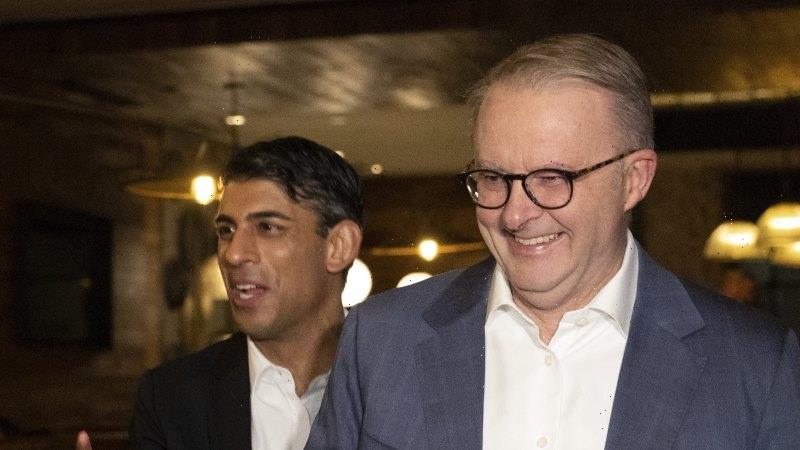Key posts
- New fleet of eight nuclear submarines to be built in Australia in $368 billion deal
- Why Australia is scaling up AUKUS pact
- Five questions about the AUKUS submarines deal that remain
- Markets bet US bank collapse could slow RBA interest rate rises
- This morning’s headlines at a glance
1 of 1
‘Mixed feelings’ if Port Kembla used as nuclear-submarine base
There are “mixed feelings” in the community of Port Kembla in NSW, if it becomes a nuclear submarine base.
Wollongong Lord Mayor Gordon Bradbery said there were concerns the area could become a strategic target if the submarines were based at the port, south of the city’s CBD.
The concerns come after it was announced Australia will build a new fleet of eight nuclear-powered submarines in Adelaide to begin service in the 2040s.
“There’s mixed feelings in the city …the economic boost and the opportunity for all the spin-offs of such an operation occurring in this region would be immense in terms of, you know, the money that would come this way and the investment, but also, of course, some people see it as a threat in terms of it being a strategic target,” he told RN Breakfast this morning.
He said he understood the concerns and said the area would need an infrastructure boost in order to host the submarines.
“There’s also great constraints transport constraints around the city as well. Because of its location right on the edge of the ocean with the escarpment behind the city. And you’ve got the highway through the city, but at the same time, its massive access or constraints in terms of its geography.”
“There are some issues there as well as the South Coast rail line. So there’s some dynamics there that need to be sorted,” he said.
New fleet of eight nuclear submarines to be built in Australia in $368 billion deal
Australia will build a new fleet of eight nuclear-powered submarines in Adelaide to begin service in the 2040s under a mammoth transformation in national defence that will cost up to $368 billion by 2055.
The government expects the full cost of the program, including construction and maintenance and service, to range from $268 billion to $368 billion over the life of the program to 2055.
Australia will build a new fleet of eight nuclear-powered submarines in Adelaide at a cost of up to $368 billion by 2055.Credit:Fairfax Media
The sweeping plan will begin by hosting more visits to Australian ports by United States submarines this year and United Kingdom vessels from 2026, clearing the way for a fixed rotation of naval power in Perth.
Over time, Australia will aim to build a new fleet of nuclear-powered submarines to a joint design with the United Kingdom so that vessels made in Adelaide can enter service in the 2040s.
More detail are available here.
Why Australia is scaling up AUKUS pact
A key measure of the fateful importance of the AUKUS alliance is that an idea devised by a conservative government is about to be made an irreversible reality by a Labor leader and his cabinet.
Prime Minister Anthony Albanese inherited the pact from his predecessor, Scott Morrison, but is taking full ownership after months of work to transform Australian naval power.
Australian Chief of Navy Vice Admiral Mark Hammond and Prime Minister Anthony Albanese during a morning walk at the Tuna Harbor Park overlooking the San Diego Bay.Credit:Alex Ellinghausen
This is an essential fact that cements the commitment to nuclear-powered submarines. Remember, Albanese has always believed there was a deception in the AUKUS announcement in September 2021.
While Morrison assured US President Joe Biden that the Coalition government briefed Labor to gain bipartisan support, Albanese felt he did not gain the full consultation this implied.
Read the full analysis on the AUKUS agreement here.
Five questions about the AUKUS submarines deal that remain
As the date of Prime Minister Anthony Albanese’s “big reveal” on AUKUS approached, significant elements of Australia’s plan to acquire nuclear-powered submarines have begun leaking out of the United States and United Kingdom.
But few details have been officially confirmed, and important questions remain.
There are five things we are most eager to learn when Albanese stands beside US President Joe Biden and UK Prime Minister Rishi Sunak in San Diego on this morning to outline Australia’s most significant defence acquisition in generations.
Read the full list here.
Markets bet US bank collapse could slow RBA interest rate rises
Financial markets are betting the dramatic failure of Silicon Valley Bank will result in a lower peak in Australian interest rates than previously expected, as the US government took sweeping action to calm market fears and ward off the threat of more bank runs.
In the biggest US bank collapse since the 2008 global financial crisis, regulators put Silicon Valley Bank into receivership over the weekend, sparking fears about the potential for fallout in the US banking sector and on global markets.
The failure of Silicon Valley Bank prompted markets to bet on less aggressive interest rate rises.Credit:Bloomberg
Yesterday morning (AEDT), those fears abated somewhat after the US government vowed no depositors would lose money in the collapse and the US Federal Reserve launched a program to provide emergency funds to American banks.
Regulators also shut down New York-based Signature Bank, saying depositors of this institution would not lose funds either.
The full story is available to read here.
This morning’s headlines at a glance
Good morning, and thanks for your company.
It’s Tuesday, March 14. I’m Caroline Schelle, and I’ll be anchoring our live coverage for the first half of the day.
Today, Prime Minister Anthony Albanese will announce details of the historic AUKUS pact in San Diego, alongside the US President Joe Biden and UK Prime Minister Rishi Sunak.
We will bring you the latest as the details are announced, with my colleagues David Crowe and Farrah Tomazin on the ground in the US.
Here’s what else you need to know before we get started:
- As the prime minister flew to the United States for the historic defence deal, his flight highlighted key partnerships in the region by starting in India, landing in Japan and avoiding Chinese airspace.
- And here are five questions about the AUKUS submarines deal that are yet to be answered.
- In other political news, the Greens will not repay more than $75,000 in donations made over 20 years by a pair of wealthy investors with significant fossil fuel holdings.
- Turning to NSW election news, where Labor will stare down demands for stronger gambling reform despite warnings it could put a minority government deal in danger.
- Financial markets are betting the dramatic failure of Silicon Valley Bank will result in a lower peak in Australian interest rates than previously expected.
- In other world news, North Korea launched a “strategic” cruise missiles from a submarine.
1 of 1
Most Viewed in National
Source: Read Full Article




